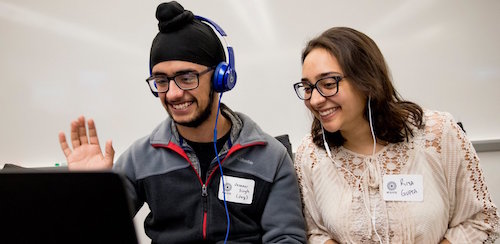Impact of Virtual Exchange Programs Topic of D.C. Panel
Wednesday, May 16, 2018

University of Michigan students chat during an M2GATE virtual exchange session.
A Washington, D.C. forum on the positive impacts virtual exchange programs can have on communities and young people worldwide included a panel discussion featuring Amy Gillett, vice president of WDI’s Education initiative.
The forum, “Inspiriting Civic Engagement through Virtual Exchange,” was sponsored by the Stevens Initiative and hosted by the Aspen Institute. It was held May 17-18. The panel discussion is featured below and begins at the 1:23:10 mark.
Gillett discussed WDI’s work this year with the Stevens Initiative on the MENA-Michigan Initiative for Global Action Through Entrepreneurship (M²GATE) program. For the first two cohorts, WDI recruited 111 students from three Michigan universities ― University of Michigan, Wayne State University and Eastern Michigan University ― and 223 of their peers from the participating Middle East and North Africa (MENA) region countries of Egypt, Libya, Morocco and Tunisia. The third and final cohort began May 25 with 60 Michigan students and 151 MENA students enrolled.
For the project, the Michigan-based students were paired with their Middle East counterparts to find entrepreneurial solutions to social challenges in the MENA region. Working virtually, teams of six developed social entrepreneurship projects and accompanying pitches over an eight-week period. Guiding them along the way were instructors, mentors, and successful entrepreneurs from MENA and Michigan. The teams coordinated times for virtual group work and produced a pitch video as a final assignment.
Gillett was joined on the panel by Jennifer Chen of World Learning and Victor Eno of Florida A&M University, leaders at two other organizations that also implemented virtual exchange programs in partnership with the Stevens Initiative. The three discussed why it is important for young people to be active participants in their communities, what they can learn about civic engagement from their global peers and how virtual exchange programs can advance participation.
“This program fundamentally changes participants’ point of view on their role in society by helping them realize that they can be the ones to address issues in society instead of waiting for the government or some other entity to take action, Gillett said. “Some of our participants are starting to refer to themselves as ‘changemakers’ and I think that’s an apt description.”
The Stevens Initiative is an international effort to build global competence and career readiness skills for young people in the United States, the Middle East and North Africa; it is funded by several public and private donors including the U.S. Department of State and the Bezos Family Foundation.
